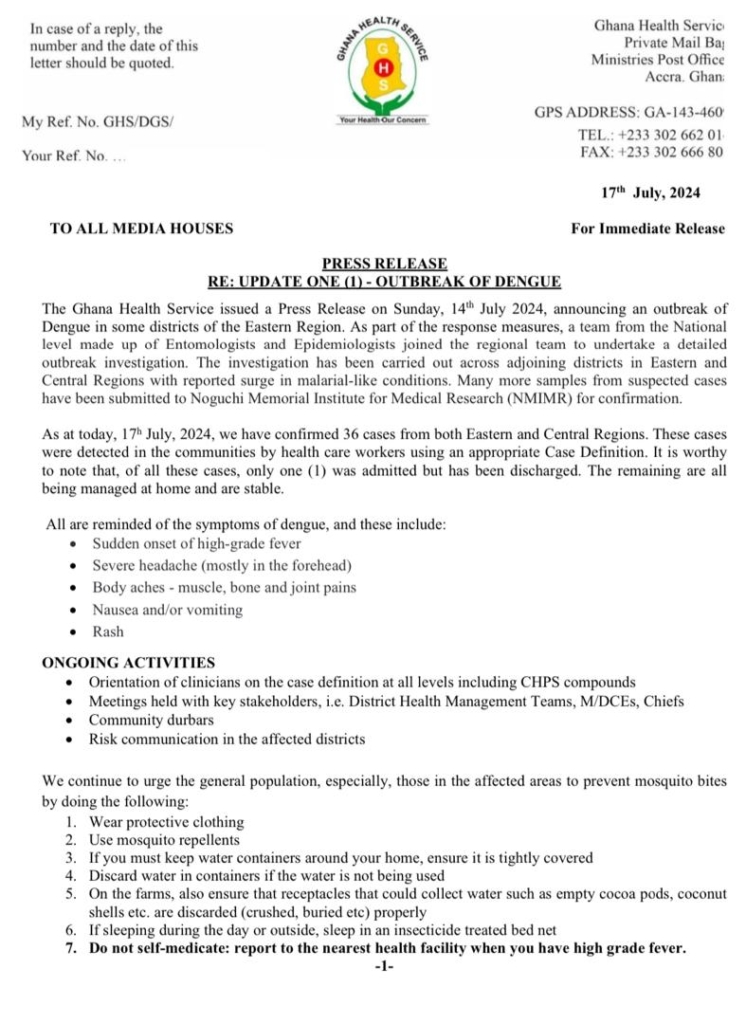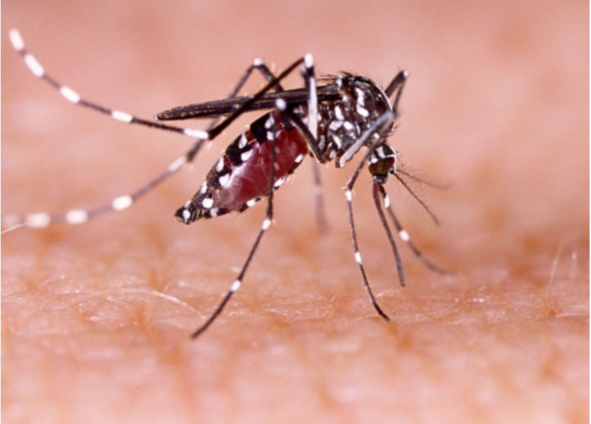The Director of Public Health at the Ghana Health Service (GHS), Dr Franklin Asiedu Bekoe, has emphasised the importance of early detection and treatment in addressing health issues.
In a recent interview, he cautioned the public against self-medicating if they experience fever, as it could be Dengue Fever, and stressed the importance of reporting to a hospital for early treatment.
"The focus is about early detection and that is what we are doing so when you have a fever, don’t assume that it is malaria then you self-medicate. Come to the hospital, we take your blood – we first find out whether it is malaria and examine the cause of the fever,” he said.
This warning follows the Ghana Health Service's statement on July 17, confirming 36 cases of Dengue Fever in the Central and Eastern regions over the past 72 hours.
The statement noted that the cases were identified using an appropriate case definition, with one patient being admitted and subsequently discharged.

Dr Bekoe assured that the recorded cases are recovering well, as most are non-severe Dengue cases.
Dr Bekoe also detailed the Ghana Health Service's latest plans to slow the spread of Dengue Fever, which includes extensive community campaigns through information centers, radio stations, and public announcements to caution people about the Aedes mosquito, which spreads the virus.
Read also: Dengue Fever: Health experts sensitise affected region
Dengue Fever, a severe flu-like illness caused by a virus spread by Aedes mosquitoes, has the potential to spread to other areas if not properly managed.
Overview of Dengue Fever: According to the World Health Organization (WHO), dengue is a viral infection transmitted to humans through the bite of infected mosquitoes.
Approximately half of the world's population is at risk, with an estimated 100–400 million infections occurring annually. Many dengue infections are asymptomatic or cause mild illness, but the virus can occasionally lead to severe cases and even death.
Danger and Prevention: Dengue is particularly dangerous because its prevention and control depend on vector control. There is no specific treatment for dengue or severe dengue. Early detection and proper medical care significantly reduce the fatality rates of severe dengue. Most people infected with dengue will not show symptoms, but common symptoms include high fever, headache, body aches, nausea, and rash.
Recovery typically occurs within 1–2 weeks, but severe cases may require hospitalization and can be fatal. The risk of dengue can be lowered by avoiding mosquito bites, especially during the day.
Symptoms of dengue fever include:
- High fever
- Severe headache
- Pain behind the eyes
- Muscle and joint pains
- Nausea
- Vomiting
- Swollen glands
- Rash
Latest Stories
-
NDC MPs back Supreme Court’s ruling on anti-LGBTQ bill petition
7 minutes -
Dr. Rejoice Foli receives Visionary Business Leader Award
10 minutes -
Economic missteps, corruption, unemployment and governance failures caused NPP’s crushing defeat – FDAG report reveals
12 minutes -
Supreme Court, EC need complete overhaul to safeguard our democracy – Benjamin Quarshie
15 minutes -
Dr. Elikplim Apetorgbor: Congratulatory message to Mahama
22 minutes -
Gabriel Kumi elected Board of the Chamber of Oil Marketing Companies
29 minutes -
Ga Mantse awards scholarships worth GHC100,000 to pupils in Ga communities
34 minutes -
NDC minority did not help the governance of the country – Afenyo-Markin
47 minutes -
NDC gov’t will struggle to fund social intervention programmes – Afenyo-Markin
53 minutes -
Man arrested for vandalising property at Parliament
55 minutes -
NDC’s internal struggle over who succeeds Mahama in 2028 has started – Afenyo-Markin claims
60 minutes -
NDC’s mischievous campaign and propaganda will soon expose them – Afenyo-Markin
1 hour -
African banks to remain exposed to domestic, global operating environments risks – Fitch
1 hour -
Premier League: Wolves agree deal for Pereira to become new boss
1 hour -
Fitch expects outlook for sub-Saharan African sovereigns to be neutral in 2025
1 hour

